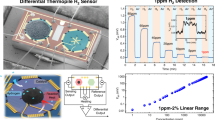Abstract
The purpose of this study was to investigate the feasibility of modulating the temperature programme of a conventional DSC by use of an alternating gas-flow system. Modulated temperature differential scanning calorimetry (MTDSC) is an important thermal analysis technique but suffers from a limited applicable frequency range due to the mass of the sample and DSC cell leading to the impingement of thermal conductivity effects. We suggest that the frequency limit can be increased by replacing the cell as the source of temperature modulation with an external gaseous source, directed towards the sample and reference pans. In this evaluation, an alternating gas-flow was passed through a line to a forced gas-flow accessory (FGFA). The FGFA consisted of two matched cylinders containing chambers that allowed pre-temperature-equilibration of the stream of gas before it was passed over the sample and reference pans. The development of this device revealed the essential practical requirements of gas-flow modulation for high-frequency temperature modulation. These include the following: an appropriately sealed tunable gas supply to both sample and reference pans, an effective method for high-frequency cycling of the gas-flow rate, a small aperture to deliver the flowing gas directly over the pan and a temperature equilibration chamber. The results from samples of quenched PET and amorphous Saquinavir indicate that gas-flow modulation is indeed feasible, with the FGFA able to raise the attainable temperature modulation frequency by an order of magnitude compared to conventional MTDSC.
Similar content being viewed by others
References
M. Reading, D. Elliott and L. V. Hill, Proc. 21st North American Thermal Analysis Society (NATAS) Conference, 1992, pp 145-150.
M. Reading, D. Elliott and V. L. Hill, J. Thermal Anal., 40 (1993) 949.
M. Reading, Trends Poly. Sci., 1 (1993) 248.
M. Reading, J. Therm. Anal. Cal., 54 (1998) 411.
B. Wunderlich, Thermochim. Acta, 300 (1997) 43.
S. Swier, G. Van Assche, A. Van Hemelrijck, H. Rahier, E. Verdonck and B. Van Mele, J. Therm. Anal. Cal., 54 (1998) 585.
N. J. Coleman and D. M. Q. Craig, Int. J. Pharm., 135 (1996) 13.
P. G. Royall, D. Q. M. Craig and C. Doherty, Pharm. Res. 15 (1998) 1117.
V. L. Hill, D. Q. M. Craig and L. C. Feely, Int. J. Pharm., 161 (1998) 95.
H. McPhillips, D. Q. M. Craig, P. G. Royall and L. V. Hill, Int. J. Pharm., 180 (1999) 83.
TA Instruments Application Note TA-210. Modulated DSC compendium; Basic theory and experimental considerations. TA Instruments, 1996, New Castle, DE, US.
D. Q. M. Craig and P. G. Royall, Pharm. Res., 15 (1998) 1152.
D. Q. M. Craig, P. G. Royall, V. L. Kett and M. L. Hopton, Int. J. Pharm., 179 (1999) 179.
Author information
Authors and Affiliations
Rights and permissions
About this article
Cite this article
Royall, P.G., Craig, D.Q.M., Reading, M. et al. The Development of Gas-flow Modulation for High-frequency MTDSC measurements. Journal of Thermal Analysis and Calorimetry 60, 795–805 (2000). https://doi.org/10.1023/A:1010143304958
Issue Date:
DOI: https://doi.org/10.1023/A:1010143304958




